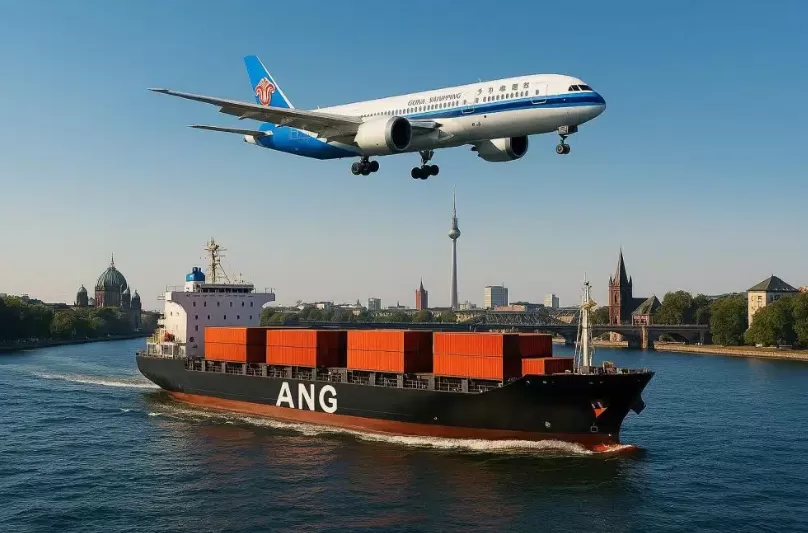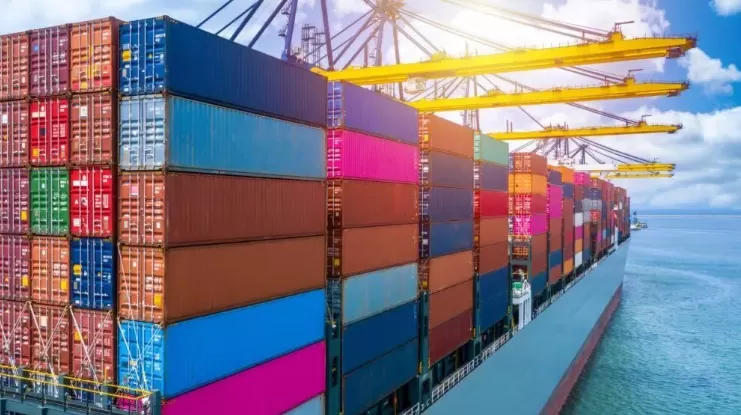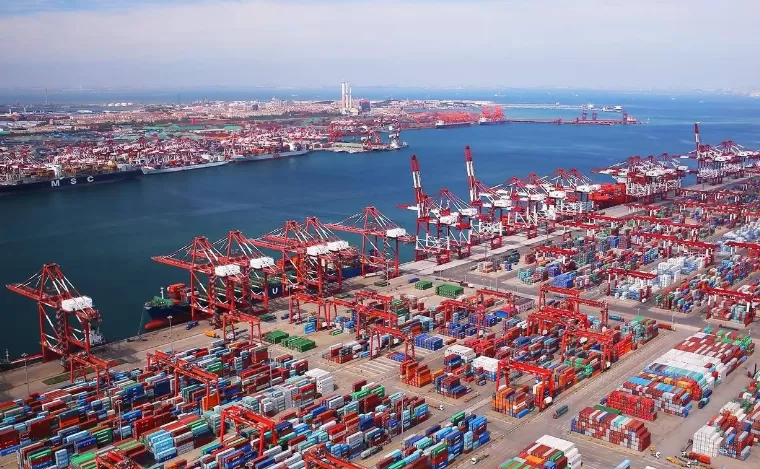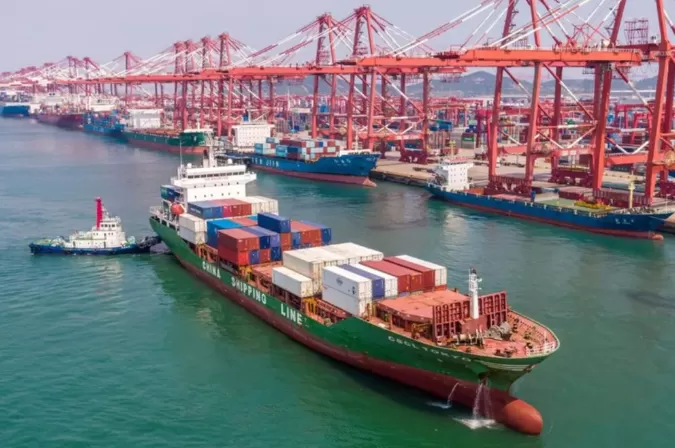Munich isn't just another German destination—it's Bavaria's economic powerhouse with unique logistics requirements that generic Germany shipping guides completely miss. Whether you're supplying the automotive industry, expanding your e-commerce presence, or establishing a foothold in Southern Europe's wealthiest market, understanding Munich-specific logistics is your competitive advantage.
Here's what most companies get wrong about Munich shipping: They treat it as a standard German destination, missing crucial details about Bavarian regulations, Munich Airport's specialized facilities, and the city's urban delivery restrictions that can make or break your supply chain efficiency.
Are you ready?
Get real-time quotes for Munich
Get Quotes
Munich's Logistics Ecosystem: Beyond the Basics
The Strategic Advantage of Bavaria's Capital
Munich serves as the primary gateway to Southern Germany, Austria, and Switzerland, offering logistics infrastructure that most cities can't match:
Air Cargo Excellence at MUC:
Ranked among Europe's top 10 cargo airports
Specialized facilities for pharmaceuticals (GDP certified), perishables, and high-value goods
Direct flights from major Chinese hubs: Shanghai (daily), Beijing (5x weekly)
Inland Connectivity:
Direct rail connections to Chinese terminals via the New Silk Road
Four major autobahns (A4, A8, A9, A99) connecting to Central European markets
Munich's own container terminals and freight centers
Industrial Clusters Driving Demand:
Automotive: BMW headquarters and extensive supplier network
Technology: Siemens, Microsoft, and thriving startup ecosystem
Biotech & Healthcare: Leading research institutions and medical centers
Quick Comparison: Munich Shipping Methods at a Glance
| Method |
Best For Munich |
Transit Time |
Cost per kg/CBM |
Key Munich Advantage |
| Express |
<120kg urgent parcels |
3-5 days |
€12-€25/kg |
Direct to Munich business addresses |
| Air Freight |
100kg+ urgent goods |
5-8 days |
€3.50-€5.00/kg |
MUC specialized handling facilities |
| Sea LCL |
1-15 CBM volume |
35-50 days |
€75-€180/CBM |
Cost-effective Bavarian market entry |
| Sea FCL |
Full container loads |
30-45 days |
€50-€95/CBM |
Complete control to Munich terminals |
| Rail Freight |
Heavy equipment |
18-25 days |
€4.50-€7.50/kg |
Perfect balance for manufacturers |
Detailed Weight & Volume Analysis: Precision Pricing
Air Freight: Weight-Specific Strategies
100kg Air Freight to Munich:
Cost Breakdown:
Base rate: €3.50-€5.00/kg = €350-€500
Munich Airport charges: €80-€120
Security & fuel surcharges: €120-€180
Total: €550-€800 door-to-door
Operational Reality:
Minimum charges apply (typically 100kg)
Consolidation with other Munich-bound shipments
4-7 day transit from Shanghai to Munich Airport
Direct flights available from PVG/SHA to MUC
200kg Air Freight to Munich:
Economies of Scale:
Base rate: €2.80-€4.20/kg (15-20% discount)
Dedicated pallet space on aircraft
Priority customs processing at MUC
Total: €900-€1,200 door-to-door
Strategic Advantages:
Temperature-controlled options available
Direct trucking from MUC to Munich facilities
Better security for high-value items
Sea Freight FCL: Container-Specific Deep Dive
20' Container (28 CBM) to Munich:
Technical Specifications:
Internal: 5.89m × 2.35m × 2.39m
Payload: 21,700 kg
Door Opening: 2.34m × 2.28m
Munich-Specific Costs:
Ocean freight: €1,200-€1,800
Hamburg port charges: €450-€650
Inland to Munich: €550-€850
Bavarian customs clearance: €200-€350
Total: €2,800-€4,500
40' High Cube Container (68 CBM) to Munich:
Volume Optimization:
Extra height: 2.70m internal
Perfect for furniture, textiles, lightweight auto parts
Cost per CBM: 25-35% lower than 20' container
Total Cost Breakdown:
Ocean freight: €1,800-€2,600
Port & inland charges: €1,400-€1,900
Munich handling: €300-€500
Total: €3,800-€6,200
Sea Freight LCL: Volume-Based Smart Shipping
1 CBM LCL to Munich:
Small Volume Economics:
Rate: €95-€180/CBM
Minimum charge: 1 CBM
Munich deconsolidation: €80-€120
Total: €250-€400 all-in
Operational Reality:
6-8 week transit time
Shared container with 10-20 other shipments
Perfect for testing Bavarian market demand
5 CBM LCL to Munich:
SME Sweet Spot:
Rate: €85-€160/CBM (10-15% discount)
Better space allocation in container
Total: €550-€900
Strategic Advantage:
Balance between cost and cargo control
Suitable for established import patterns
Munich warehouse receiving optimized
10 CBM LCL to Munich:
Decision Point Analysis:
Rate: €75-€140/CBM
Total: €900-€1,600
Critical question: Should you consider FCL?
Break-even: 12-15 CBM often justifies 20' container
Logistics Models: Munich-Specific Implementation
Sea Pick for Munich
The E-commerce Game Changer:
Process: Hamburg port → customs clearance → DHL/UPS to Munich addresses
Cost: Base sea freight + €150-€300 courier fee
Transit: 2-4 days from Hamburg to Munich
Perfect For: Amazon FBA, urgent retail deliveries
Munich Advantages:
Weekend delivery capability
Direct to business parks throughout Munich
Real-time tracking through final delivery
Sea Card for Heavy Cargo
Munich Regional Trucking:
Process: Hamburg → full truckload to Munich
Cost: €550-€850 per truckload
Capacity: 20-30 pallets per truck
Delivery: Business hours, loading dock required
Munich-Specific Considerations:
Low emission zone compliance (Green sticker)
Truck size restrictions in city center
Time windows for urban deliveries
The Hassle-Free Munich Solution:
Scope: Chinese warehouse → Munich doorstep
Cost: All fees included + 10-15% service fee
Risk Management: Single point of responsibility
Perfect For: First-time importers, high-value goods
Munich Value-Add:
Bavarian customs expertise
Local trucking partnerships
Emergency response capability
For Experienced Importers:
Scope: Chinese port → Hamburg port only
Cost Savings: 20-30% vs door-to-door
Responsibilities: You handle Munich logistics
Suitable For: Established importers with Munich partners
Amazon FBA
Get real-time quotes for Munich
Get Quotes
Amazon FBA Munich: Specialized Solutions for Sellers
Small-Medium Seller Success Strategies
Inventory Management Trio:
Sea LCL + Sea Pick: Cost-effective replenishment (€75-€180/CBM)
Air Freight: New product launches and peak season (€3.50-€5.00/kg)
Express: Critical stockouts (€12-€25/kg)
Munich FBA Specifics:
Warehouse Locations: Multiple FBA facilities around Munich
Appointment Scheduling: Strict time slots, German precision required
Labeling Standards: Bavarian compliance beyond standard FBA
Returns Processing: Munich-based returns handling
Cost Optimization for Bavarian Market:
Shipment Consolidation: Combine multiple SKUs for better rates
Seasonal Planning: Oktoberfest, Christmas peak strategies
Inventory Turnover: Bavarian consumer behavior analysis
Munich Customs & Bavaria-Specific Regulations
Bavarian Customs Office Requirements
Critical Documentation Differences:
Commercial Invoice with exact German goods descriptions
Packing List with gross/net weights in metric
Certificate of Origin for preference claims
Bavaria-Specific: Proof of business registration in Bavaria
Common Munich Customs Pitfalls:
Underdeclaring values for high-value automotive parts
Incorrect HS codes for technology equipment
Missing safety certificates for children's products
Inadequate proof of EU compliance standards
Munich Import Restrictions & Special Requirements
Prohibited Items:
Certain agricultural products without phytosanitary certificates
Protected species materials (CITES restrictions)
Counterfeit goods and intellectual property violations
Restricted Items Requiring Special Permits:
Pharmaceuticals and medical devices
Chemicals and hazardous materials
Radio equipment and telecommunications devices
Cost Optimization: Munich-Specific Strategies
Route-Specific Cost Savings
Technology Components:
Air freight to MUC + bonded warehouse
Just-in-time delivery to manufacturing plants
Cost: €3.50-€5.00/kg + warehouse fees
Automotive Parts:
Sea FCL to Hamburg + rail to Munich
Consolidate with other Bavarian manufacturers
Cost: €50-€95/CBM + rail transport
Retail Goods:
Sea LCL to Hamburg + cross-dock in Munich
Regional distribution to Austrian markets
Cost: €75-€180/CBM + distribution
Munich Seasonal Considerations
Q4 Peak Season (Oct-Dec):
Book air freight 3-4 weeks in advance
Sea freight space allocation challenges
20-40% rate premiums expected
Octoberfest Impact (September):
Reduced truck availability in Munich region
Hotel and accommodation shortages
Plan shipments for early August or post-Octoberfest
Winter Months (Nov-Feb):
Potential rail delays due to weather
Alpine route disruptions possible
Build 5-7 day buffer into transit plans
freight forwarding
Get real-time quotes for Munich
Get Quotes
Freight Forwarder Selection: Munich Expertise Required
Critical Munich-Specific Capabilities
Local Knowledge Must-Haves:
Bavarian customs brokerage licensing
Munich trucking partnerships and fleet access
Warehouse relationships in greater Munich area
Emergency response network for urgent situations
Technical Competencies:
Real-time tracking to Munich destination
Munich-specific documentation expertise
Contingency planning for Alpine weather disruptions
Multi-modal coordination capabilities
Performance Metrics for Munich Route:
On-time delivery to Munich addresses (>95% target)
Customs clearance efficiency at Munich (<48 hours)
Damage and loss rates for Munich route (<0.5% target)
Customer service responsiveness in German timezone
Implementation Framework: Your Munich Action Plan
Immediate Actions (First 30 Days)
1.Cargo Profile Assessment:
Document exact weights, dimensions, and product types
Determine urgency requirements and budget constraints
Identify any special handling needs for Munich delivery
2.Partner Selection:
Vet 3-4 Munich-experienced forwarders
Check Bavarian customs brokerage credentials
Verify Munich local trucking partnerships
3.Documentation Preparation:
Gather Bavarian-specific paperwork requirements
Prepare EU compliance documentation
Set up German language support if needed
Medium-term Optimization (1-6 Months)
1.Route Refinement:
Analyze performance data from initial shipments
Adjust methods based on actual transit times and costs
Develop relationships with Munich logistics providers
2.Cost Management:
Negotiate volume-based discounts
Implement continuous rate monitoring
Optimize shipping frequency and batch sizes
3.Process Improvement:
Streamline Munich-specific workflows
Implement technology solutions for tracking and management
Develop Bavarian market intelligence capabilities
Long-term Strategy (6+ Months)
1.Relationship Building:
Develop strategic partnerships with Munich logistics providers
Establish relationships with Bavarian business networks
Participate in Munich logistics and trade events
2.Technology Integration:
Implement advanced tracking and visibility systems
Automate documentation and customs processes
Develop data analytics for continuous improvement
3.Scale Planning:
Plan for increased volumes and additional product lines
Explore warehouse options in the Munich region
Develop contingency plans for growth scenarios
Get Your Personalized Munich Shipping Assessment
Every business has unique Munich shipping requirements. Based on your specific needs—whether you're serving the automotive sector, expanding e-commerce presence, or establishing industrial operations—we can develop a tailored logistics strategy that leverages Munich's unique advantages while avoiding common pitfalls.
Ready to optimize your China to Munich supply chain?
[Get Your Custom Munich Shipping Quote & Strategy Session]
Key Takeaways for Munich Shipping Success
Munich requires specialized knowledge beyond standard German shipping procedures
Weight and volume-specific strategies deliver significant cost savings
Bavarian regulations demand attention to detail in documentation and compliance
Multiple logistics models offer flexibility for different business needs
Amazon FBA sellers have unique opportunities for Munich market penetration
Seasonal planning is crucial for maintaining reliable supply chains
The right freight forwarder makes all the difference in Munich shipping success
By implementing the strategies outlined in this comprehensive guide, you'll be positioned to leverage Munich's strategic advantages while avoiding the common mistakes that undermine many companies' European logistics operations.
Frequently Asked Questions (FAQs)
1. Q: What is the difference between volumetric weight and actual weight, and which one determines my shipping cost to Munich?
A: Carriers charge based on whichever weight is greater. Actual weight is what your shipment weighs on a scale. Volumetric weight is calculated based on size: (Length x Width x Height in cm) / 5000 for air freight and (LxWxH in cm) / 6000 for courier services. This is why lightweight but bulky items can be expensive to ship to Munich.
2. Q: How do I calculate the customs value for my goods shipped to Munich?
A: The customs value includes the cost of goods, plus insurance, and freight charges (CIF value). You must declare the true transaction value of your goods. Undervaluing can lead to severe penalties from German customs authorities, including shipment seizure and fines up to 400% of the evaded duties.
3. Q: What is a customs bond, and do I need one for importing into Munich as a non-EU business?
A: If your business is established outside the EU, you'll need an importer of record in Germany to handle customs clearance. EU-based businesses need an EORI number. A customs bond may be required for certain types of goods or if you're using specific customs procedures. Your freight forwarder can advise if this applies to your shipment.
4. Q: Can I ship lithium batteries or other dangerous goods to Munich?
A: Yes, but with strict limitations. Lithium batteries require UN38.3 certification, specific packaging, and labeling. Air freight has the most restrictions, while sea freight is more accommodating. You must declare dangerous goods upfront and work with carriers that accept them, as not all do.
5. Q: What happens if my shipment misses the vessel or flight in China?
A: This is called "rollover." Your goods will be placed on the next available vessel/flight, which can cause 1-2 weeks delay. During peak season, this is common. A good freight forwarder will monitor this and may secure priority space or alternative routing to minimize disruption to your Munich supply chain.
6. Q: How does currency exchange affect my shipping costs to Munich?
A: Ocean freight is typically priced in USD, while local charges in Germany are in EUR. Exchange rate fluctuations can impact your final cost by 3-8%. Some forwarders offer rate locking, while others charge based on the exchange rate at payment time. Always confirm which currency your quote is in.
7. Q: What is the difference between a freight forwarder and a customs broker for Munich shipments?
A: A freight forwarder coordinates the physical movement of your goods from China to Munich. A customs broker specializes in clearing your goods through German customs. Many companies offer both services, but they're technically separate functions. For Munich shipments, it's crucial both parties coordinate effectively.
8. Q: Can I ship food products or supplements from China to Munich?
A: Yes, but with extensive documentation. You'll need health certificates, ingredient lists, and proof of compliance with EU food safety regulations. Certain products like meat, dairy, or novel foods have additional restrictions. Always verify your specific product's requirements before shipping.
9. Q: What is the process if German customs selects my shipment for inspection in Munich?
A: Customs may perform a physical or documentary inspection. This typically adds 3-7 days to your clearance time and incurs inspection fees (€100-€500). Having complete, accurate documentation significantly reduces inspection likelihood. If selected, your customs broker will coordinate the process.
10. Q: How do I handle warranty returns or defective products from Munich back to China?
A: You'll need to arrange export customs from Germany and import customs back into China. The process requires different documentation than the original shipment, including proof the goods were originally imported and reasons for return. Some companies use specialized return logistics providers for this complex process.
11. Q: What's the difference between a house bill of lading and a master bill of lading for Munich shipments?
A: A master bill is issued by the carrier to your freight forwarder, while a house bill is issued by your forwarder to you. If you're working with a forwarder, you'll receive a house bill. This distinction matters for liability and control of the goods during transit to Munich.
12. Q: How far in advance should I start planning my first shipment from China to Munich?
A: Allow 4-6 weeks for your first shipment. This gives time to find the right partners, understand requirements, prepare documentation, and account for any unexpected issues. Subsequent shipments can be planned with shorter lead times as processes become established.

 EN
EN
 FR
FR
 ES
ES
 JA
JA
 PT
PT
 RU
RU
 AR
AR









